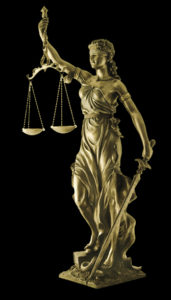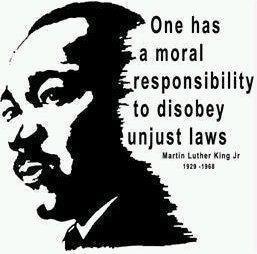Is an Immoral Law a Good Law?
The question may be a misleading one; to clear this, I will not look into what the words moral (or immoral) or good might mean in this context, I would rather define them just as we begin.
 Moral, in this context would be concerned with the principles of right and wrong: in the sense of what one believes or perceives to be wrong.
Moral, in this context would be concerned with the principles of right and wrong: in the sense of what one believes or perceives to be wrong.
Good, in this context would mean valid and acceptable.
This simplifies the question at hand: Would a law, which is wrong in principle, be deemed to be a valid and acceptable law?
This question deals with the centuries old debate between the Naturalist and the Positivist view of law.
According to the Positivist view, a law is a law when it is validly enacted or proclaimed, and is binding in its entirety, regardless of whether it is moral or not.
The Naturalist view on the other hand is that, an immoral law is not a good law: a law must be moral to be valid. It must conform to the basic standards of right and wrong; a law which is unjust or immoral will not be law.
On the offset it is easy to dismiss the Naturalistic view: law is what distinguishes the right from the wrong. How could a law be wrong?
To better understand the Naturalistic view, and to appreciate for what it stands, we must understand what law is, and what purpose it serves.
I would argue that law is the collective embodiment of the rules a society makes for itself. Law is the foundation of a civilized society. Just as morality of the society evolves, so must the law. An old law, by today’s standards may be immoral and unjust.
An example may be the Witchcraft Acts enacted by different countries throughout the world in the 16th Century, and the inquisitions, trials and lawful executions that were done under them, by today’s standards are immoral and unjust. Surprisingly enough, these remnants of the past continue to exist in statute books of some countries.
Let us change the question to this: would the implementation of the Witchcraft Act, to accuse and punish an individual on the pseudoscience contained in the law, be moral and just? Should it be enforced?
 In Plato’s work Crito, the reason Socrates gives for his obedience to the law and the nature of the law, reflects upon the utility of law for a society. Law is what a civilized society is built upon.
In Plato’s work Crito, the reason Socrates gives for his obedience to the law and the nature of the law, reflects upon the utility of law for a society. Law is what a civilized society is built upon.
It also makes one see the potential for abuse in a democracy. Democracy has the tendency to become mob rule: where the majority oppresses a minority.
Abusive laws are all around us: law has mandated slavery, racial segregation, suppressed classes of humans based on their sex, economic status, race, color and lineage. This was true in the past, and is still true today in many jurisdictions.
The concept of liberty, individual autonomy and human rights play their part in protecting an individual. According to a widely circulate quote, misattributed to Benjamin Franklin:
Democracy is two wolves and a lamb voting on what to have for lunch. Liberty is a well-armed lamb contesting the vote.
Liberty and Freedom are a recognition of certain rights which may not be taken away, not even by a 99% vote.
Many modern constitutional democracies like the United States, India, France, Germany etc. do recognize this. The US Bill of Rights and the French Declaration of the Rights of Man recognize certain rights, freedoms and liberties that the state cannot take away, under any circumstances.
This may be seen as either Naturalistic or Positivistic; consider the following statements:
- Human Rights are protected because the Constitution says they are protected.
- The Constitution protects Human Rights because they ought to be protected.
The first one sees Constitutional schemes to protect rights as Positivistic and the second sees them as Naturalistic.
 Under either circumstances, an immoral law will not be a good law, regardless of whether it isn’t a good law because it is immoral or because another, higher law, the Constitution, says so.
Under either circumstances, an immoral law will not be a good law, regardless of whether it isn’t a good law because it is immoral or because another, higher law, the Constitution, says so.
Things become interesting when in the absence of a Constitution, an immoral law is considered in abstract: would a law condemning disabled children to death, be a good law?
The answer may depend on whether it is enforced. The Witchcraft Act is a valid piece of legislation existing in the statute books of countries like South Africa and Israel. Is it enforced? No. Would it still count as a good law? That might be a question of whether it would be enforced when it needs to be.

Would I personally enforce an immoral law? Not if it violates the rights and liberties of a person for no fault of their own. At the end of the day, law is the embodiment of the collective wishes of the people. If the majority brutally crushed the minority using the law, then instead of serving as a utility the law would become a weapon or an excuse to commit atrocities – the Nazi Germany, for example, used laws to exterminate the old, sick and disabled, and minorities.


Leave a Reply